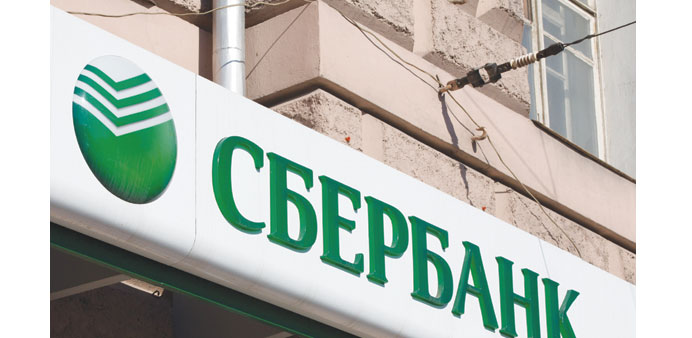Sberbank, Russia’s biggest bank by assets, reported an 18% slide in profits yesterday and more than doubled its provisions for bad loans, hit by the Ukraine crisis, a falling rouble and an economy flirting with recession.
Once feted for its fast-growing economy, Russia is now forecast to achieve growth of just 0.5% this year, hurt by Western sanctions and instability brought by the stand-off with Kiev and wider emerging market uncertainty.
State-owned bank Sberbank — viewed as a proxy for the broader Russian economy — joined its smaller rival VTB in announcing worse than expected results for the first quarter this year.
Net profit dropped to 72.9bn roubles ($2.1bn) from 88.5bn a year ago, and also fell short of analysts’ consensus forecast in a Reuters poll of 78.2bn.
“(The) operating environment in the Russian Federation during the first quarter 2014 remained subject to several negative factors,” Sberbank said in its earnings report. “In particular, recent events in Ukraine significantly impacted the dynamics of the Russian economy.”
Provisions for possible bad loans jumped to 77.1bn roubles from 31.8bn a year ago. The bulk of this was for commercial loans, followed by those to individuals.
“Ukraine, devaluation of the rouble and the worsening economic situation played a role in the additional reserves in the corporate and retail segment,” said Andrey Klapko, analyst at Gazprombank.
Investors have reacted badly to the confrontation with Kiev over Moscow’s annexation of Crimea followed by a separatist rebellion in eastern Ukraine. Russian markets have generally fallen when the violence has worsened, but have recovered some lost ground on hopes of a diplomatic solution which so far seem slim.
The slide in the rouble caused people to buy more foreign currency, with the volume exceeding the level during the 2008 financial crisis, Sberbank said.
On Tuesday VTB reported a 98% plunge in net profit plus a rise in bad loan provisions and non-performing loans.
Sberbank did not break down the bad loans geographically. It has exposure of 130bn roubles ($4bn) to Ukraine, less than 1% of its balance sheet, and has said it has no plans to leave the country.
A fall in the value of Ukraine’s hryvnia — down more than 40% against the dollar this year — and restrictions on purchases of foreign currencies resulted in a deterioration of liquidity and much tighter credit conditions, Sberbank said.
“Management is monitoring these developments in the current environment and taking actions where appropriate,” it said. These and other possible factors in Ukraine could adversely impact the bank’s financial position and results “in a manner not currently determinable”.
Sberbank said the growth rate in retail loans slowed, reflecting high debt burdens of individuals and tighter requirements by banks in issuing new loans. A rise in overdue retail loans accelerated, it said.
Non-performing loans rose to 3.2% of the portfolio from 2.9% at the end of 2013.
In March, the Russian banking system saw a net outflow of retail deposits, it said, as a lack of income growth reduced individuals’ ability to save money.

